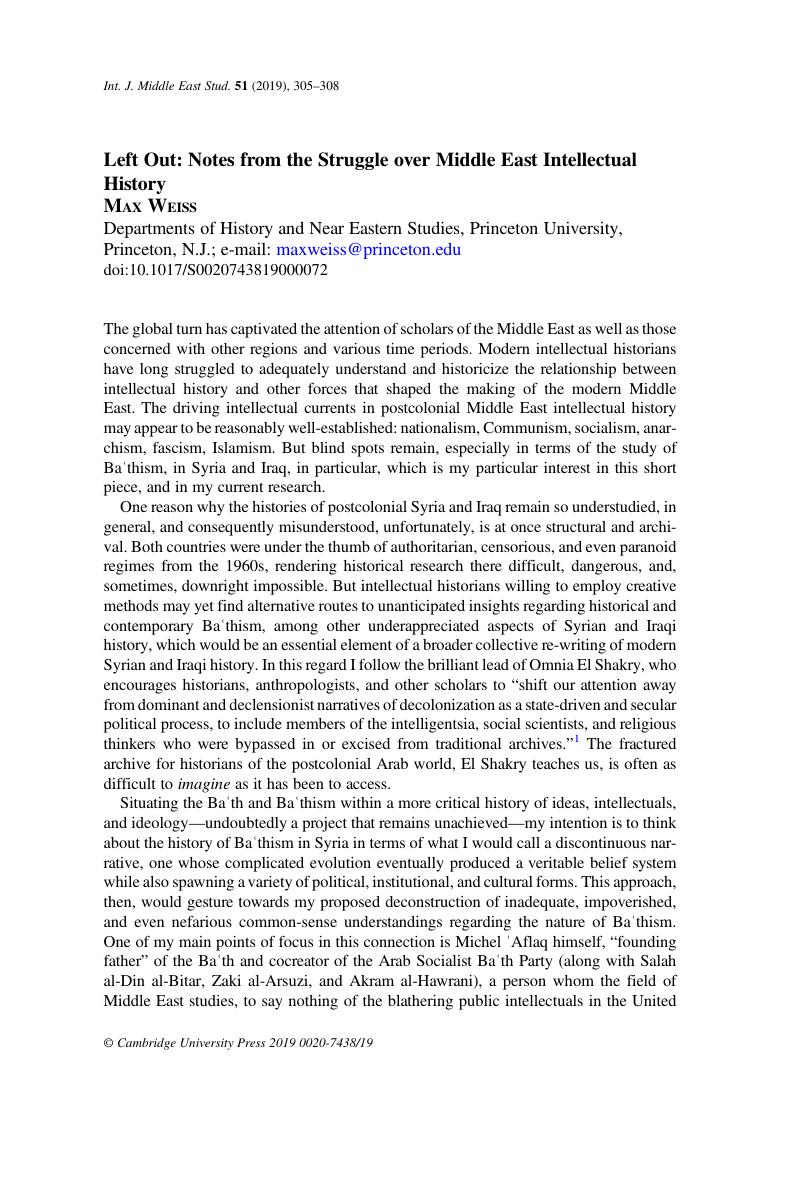No CrossRef data available.
Published online by Cambridge University Press: 14 March 2019

1 Shakry, Omnia El, “‘History without Documents’: The Vexed Archives of Decolonization in the Middle East,” American Historical Review 120 (2015): 925–34CrossRefGoogle Scholar.
2 I take up this question in greater detail in my article, “Genealogies of Syrian Baʿthism: Michel ʿAflaq between Personalism and Arabic Nationalism,” Modern Intellectual History (forthcoming).
3 Exceptions to this overly broad generalization includes, among others, Wien, Peter, Iraqi Arab Nationalism: Authoritarian, Totalitarian, and Pro-Fascist Inclinations, 1932–1941 (London: Routledge, 2006)Google Scholar; Nordbruch, Götz, Nazism in Syria and Lebanon: The Ambivalence of the German Option, 1933–1945 (London: Routledge, 2009)Google Scholar; Achcar, Gilbert, The Arabs and the Holocaust: The Arab–Israeli War of Narratives (New York: Metropolitan Books, 2010)Google Scholar; Gershoni, Israel and Jankowski, James P., Confronting Fascism in Egypt: Dictatorship Versus Democracy in the 1930s (Stanford, Calif.: Stanford University Press, 2010)Google Scholar; “Islamofascism,” special issue, Die Welt des Islams 52 (2012)Google Scholar; Gershoni, Israel, ed., Arab Responses to Fascism and Nazism: Attraction and Repulsion (Austin, Tex.: University of Texas Press, 2014)Google Scholar. With the exception of Achcar, however, none of these works are particularly interested in the Baʿth or Baʿthists.
4 The only book-length translation into Arabic of one of these two men that I have found thus far is Maritain, Jacques (Jak Martan), Jadwa al-Falsafah: Thalath Maqalat, trans. Najib al-Rayyis, Riyad (Beirut: al-Muʾassasa al-Wataniyya li-l-Tibaʿa wa-l-Nashr, 1963)Google Scholar.
5 Cheah, Pheng, Spectral Nationality: Passages of Freedom From Kant to Postcolonial Literatures of Liberation (New York: Columbia University Press, 2003)CrossRefGoogle Scholar.
6 I am thinking specifically of the work of Paul Berman, for example. See, first, his Terror and Liberalism (New York: W.W. Norton, 2004), esp. 54–60Google Scholar; and, later,“Baathism: An Obituary,” The New Republic, 24 September 2012.